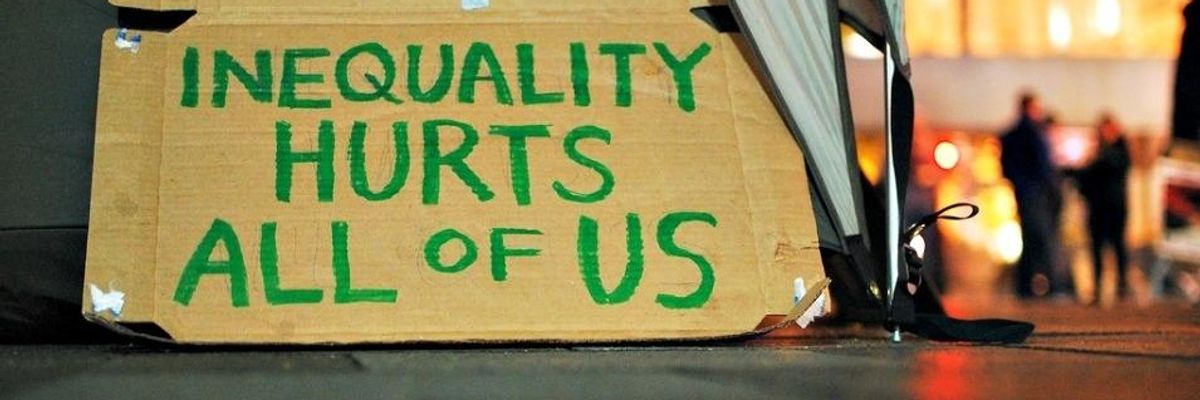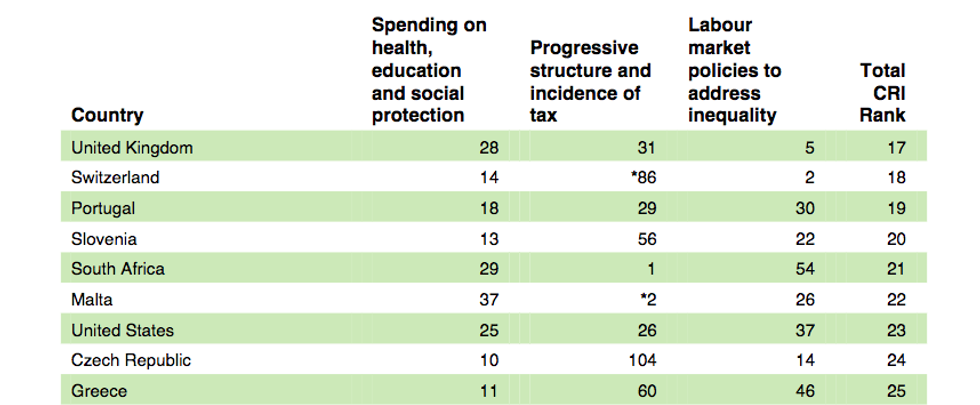The United States is already the most unequal industrialized nation in the world, and a new report published on Monday shows that President Donald Trump's agenda would only make matters worse.
"This inequality crisis is characterized by a situation whereby just eight men own the same wealth as the poorest 3.5 billion people."
--Max Lawson and Matthew Martin
"The Commitment to Reducing Inequality Index," developed by Oxfam in partnership with Development Finance International (DFI), uses several factors to "measure the commitment of governments to reducing the gap between the rich and the poor."
Compared to other wealthy nations, the report concludes, the U.S. is doing "very badly" in the fight against income and wealth inequality.
"The CRI Index measures government efforts in three policy areas or 'pillars': social spending, taxation, and labor," the authors--Oxfam's Max Lawson and DFI's Matthew Martin--note. "These were selected because of widespread evidence that strong positive progressive actions by governments in these three areas have played a key part in reducing the gap between rich and poor."
Lawson and Martin continue:
Many countries across the world, rich and poor, have experienced a rapid growth in the gap between the richest people in society and everyone else over the past 30 years. This inequality crisis is characterized by a situation whereby just eight men own the same wealth as the poorest 3.5 billion people. Failure to tackle this growing crisis is undermining social and economic progress and, crucially, the fight against poverty. Oxfam's research has shown that, since the turn of the century, the poorest half of the world's population has received just 1% of the total increase in global wealth, while the top 1% received 50% of the increase.
In the face of these startling numbers, Oxfam and DFI compiled data and ranked countries by how aggressively they are attempting to address these stark disparities. The U.S., the report notes, is not moving with much urgency.
"The USA is the wealthiest country in the history of the world, but its level of inequality is also the highest among major industrial countries, leaving tens of millions of working people impoverished--especially women and people of color," Lawson and Martin observe.
The report highlights several measures that serve to perpetuate inequities within the U.S., including:
- A low effective corporate tax rate, which is due to many large companies not paying taxes at all. The authors point to 2012, when just over 42 percent of corporations paid no federal income taxes at all.
- Poor health outcomes, despite spending more than other wealthy countries on healthcare.
- Low federal minimum wage and "extremely inadequate" labor policies, which only require companies to offer unpaid maternity leave.
- The "alarming" decline of unions, which have historically been a key factor in reducing inequality.
Overall, the U.S. ranks 23rd out of 152 countries. Sweden, due to its progressive social spending and robust protections for women in the workplace, ranks first.
Analyzing Oxfam's report for the Guardian, Amanda Holpuch noted that if the policies favored by the Trump administration--including massive tax cuts for the rich and reductions in spending on Medicaid and education--are enacted, the U.S. will only fall further in the rankings.
"If the White House passes its budget, which would slash social service spending and could leave millions of Americans without health insurance," Holpuch writes, "the U.S. would fall behind Greece, which is crippled by a debt crisis; Spain, which for 10 months in 2016 did not have a government; and Argentina, which has been plagued by high inflation."
The Oxfam/DFI report argues that "policymaking processes dominated by elites undermine democracy," and only "[i]nclusive policymaking processes which respect the rights and voice of all people" can close the gap between the rich and the poor and restore genuine democracy.
"Many decades ago," Lawson and Martin conclude, "U.S. Supreme Court Justice Louis Brandeis famously said 'you can have extreme inequality or you can have democracy--you cannot have both.'"


